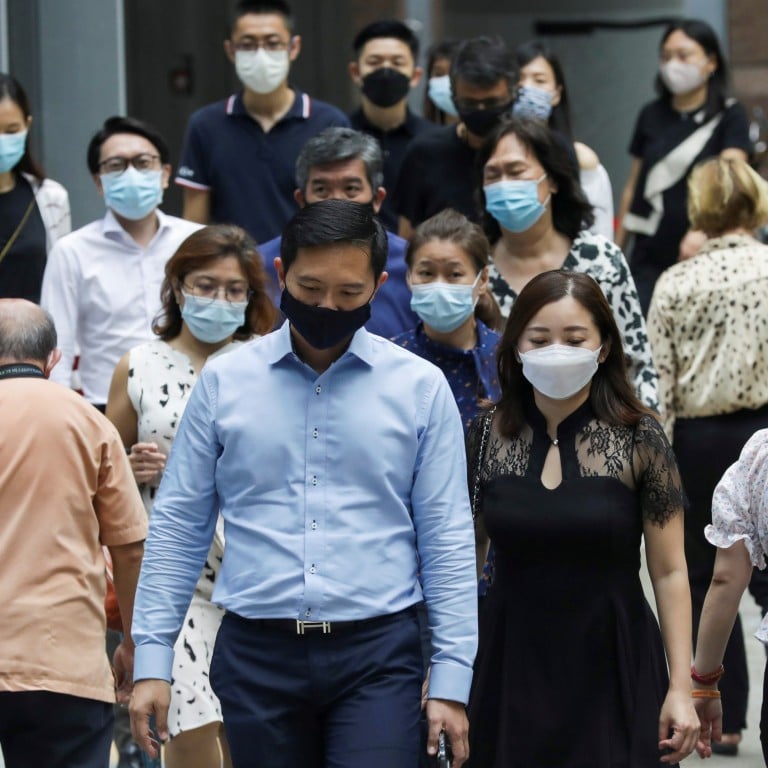
Coronavirus Singapore: tighter restrictions reimposed after surge in local cases
- Singapore on Thursday reported 24 new local cases of Covid-19, the highest number since July last year
- Authorities have banned dining in at restaurants and restricted gatherings to two people, while urging employees to work from home
Singapore on Thursday reported 24 new local cases of Covid-19, the highest number since July last year, and another 24 infections on Friday. Singapore now has 12 active clusters and has already recorded 136 domestic infections this month, compared to 55 cases in April and just nine in March.
Health minister Gan Kim Yong said it was “almost impossible” to completely eradicate the virus and “we will have to learn to live with it”.
The latest measures will take effect on Sunday and will last for four weeks until June 13. Authorities last week limited social gatherings to five people from the previous cap of eight but the increase in local cases has led to even more stringent restrictions after higher rates of transmission in recent clusters where the people infected did not wear masks.
Gan on Friday said 15 unlinked cases in the past week were cause for concern as they suggested there were further undetected cases in the community.
Authorities have also in recent weeks detected several variants of concern in both local and imported infections, such as the B. 1.617 strain that was first identified in India and is thought to be more transmissible.
Kenneth Mak, the health ministry’s director of medical services, said these variants behave differently to the strains detected last year. He cited the cluster at one of Singapore’s biggest hospitals, where individuals who wore masks and personal protective equipment (PPE) still caught the virus.
“There may have been a very high viral load, and there may have been issues with airflow and ventilation which may have exacerbated spread to susceptible individuals,” Mak said.
According to transport minister Ong Ye Kung, workers at the airport cluster, which on Friday grew to 59 infections, also became infected despite wearing masks and PPE. He said authorities were examining whether the virus variant could have been transmitted through the toilets or through common eating areas.
Under the new restrictions, which are similar to the Phase One restrictions imposed in June last year, strenuous indoor exercise and activities that require masks to be removed – such as beauty treatments, saunas and singing – will also be banned. Wedding receptions will also not be held.
Hong Kong’s ‘wait and see’ vaccine sceptics should look at Asia’s Covid-19 success stories
Lawrence Wong, the co-chair of the virus task force, acknowledged the next few weeks would be difficult.
“This is clearly a setback in our fight against Covid-19, but we are resolved to keep fellow Singaporeans safe and to see Singapore safely through this crisis,” he said.
Singapore’s situation also cast a pall over events such as the Shangri-La Dialogue, which is scheduled for early June and includes an in-person day. Wong said the government had been in contact with the organisers, who would provide an update.
As for the travel bubble, a two-week suspension would be warranted if the seven-day moving average of unlinked cases in either city exceeded five. As of Thursday, Singapore’s number was 2.29, while Hong Kong’s was 0.14.
For the bubble to resume, three criteria need to be met: the moving average on the last day of suspension is less than five; both cities report three consecutive days of no more than three unlinked cases; and the moving average on the third day is not more than five.
As West reopens, ‘zero-Covid’ economies like Hong Kong, Singapore and Australia face risks
“Given the rising cases in Singapore it is very likely that Singapore will not be able to meet the resumption criteria,” transport minister Ong said.
“So, what we are doing now is closely monitor the numbers over the next few days, critically review the start date and, early next week, we will make a decision and make an announcement on the Singapore Hong Kong ATB.”


